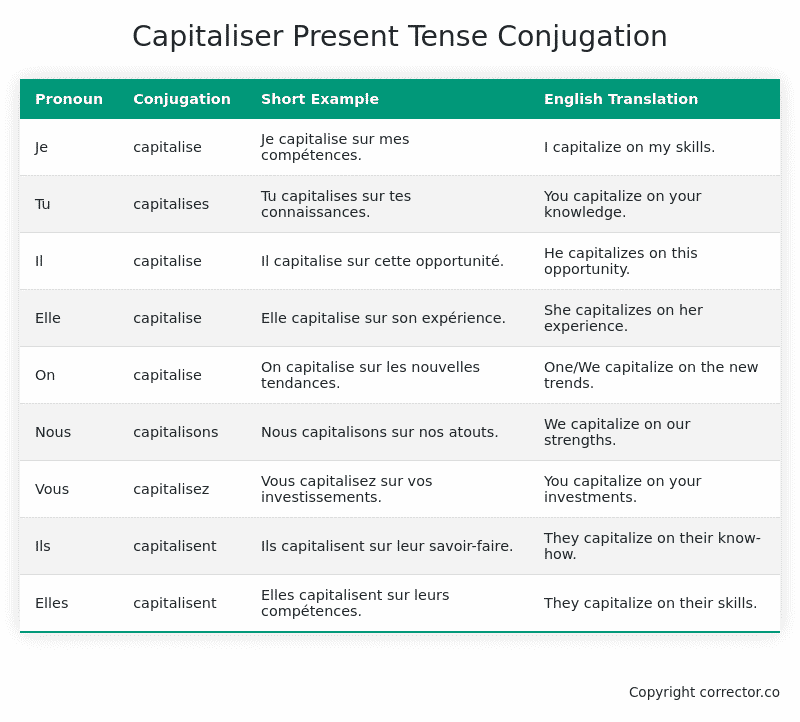Le Present (Present Tense) Conjugation of the French Verb capitaliser
Introduction to the verb capitaliser
The English translation of the French verb “capitaliser” is “to capitalize.” The infinitive form “capitaliser” is pronounced as kah-pee-ta-lee-zay.
The word “capitaliser” originates from the Latin word “capitale,” meaning “capital.” In everyday French, “capitaliser” is most often used in a financial context to refer to the act of investing capital or making profits.
Examples:
- Il a décidé de capitaliser ses économies dans l’immobilier. (He decided to invest his savings in real estate.)
- L’entreprise a su capitaliser sur son succès en lançant de nouveaux produits. (The company was able to capitalize on its success by launching new products.)
- Nous devons capitaliser sur nos compétences pour obtenir de meilleurs résultats. (We need to capitalize on our skills to achieve better results.)
Capitaliser – About the French Present Tense
To take a deep dive into all the French tenses then see our article on Mastering French Tense Conjugation.
Common Everyday Usage Patterns For Le Present
Interactions with Other Tenses
Table of the Present Tense Conjugation of capitaliser
| Pronoun | Conjugation | Short Example | English Translation |
|---|---|---|---|
| Je | capitalise | Je capitalise sur mes compétences. | I capitalize on my skills. |
| Tu | capitalises | Tu capitalises sur tes connaissances. | You capitalize on your knowledge. |
| Il | capitalise | Il capitalise sur cette opportunité. | He capitalizes on this opportunity. |
| Elle | capitalise | Elle capitalise sur son expérience. | She capitalizes on her experience. |
| On | capitalise | On capitalise sur les nouvelles tendances. | One/We capitalize on the new trends. |
| Nous | capitalisons | Nous capitalisons sur nos atouts. | We capitalize on our strengths. |
| Vous | capitalisez | Vous capitalisez sur vos investissements. | You capitalize on your investments. |
| Ils | capitalisent | Ils capitalisent sur leur savoir-faire. | They capitalize on their know-how. |
| Elles | capitalisent | Elles capitalisent sur leurs compétences. | They capitalize on their skills. |
Other Conjugations for Capitaliser.
Le Present (Present Tense) Conjugation of the French Verb capitaliser (You’re reading it right now!)
Imparfait (Imperfect) Tense Conjugation of the French Verb capitaliser
Passé Simple (Simple Past) Tense Conjugation of the French Verb capitaliser
Passé Composé (Present Perfect) Tense Conjugation of the French Verb capitaliser
Futur Simple (Simple Future) Tense Conjugation of the French Verb capitaliser
Futur Proche (Near Future) Tense Conjugation of the French Verb capitaliser
Plus-que-parfait (Pluperfect) Tense Conjugation of the French Verb capitaliser
Passé Antérieur (Past Anterior) Tense Conjugation of the French Verb capitaliser
Futur Antérieur (Future Anterior) Tense Conjugation of the French Verb capitaliser
Subjonctif Présent (Subjunctive Present) Tense Conjugation of the French Verb capitaliser
Subjonctif Passé (Subjunctive Past) Tense Conjugation of the French Verb capitaliser
Subjonctif Imparfait (Subjunctive Imperfect) Tense Conjugation of the French Verb capitaliser
Conditionnel Présent (Conditional Present) Tense Conjugation of the French Verb capitaliser
Conditionnel Passé (Conditional Past) Tense Conjugation of the French Verb capitaliser
Conditionnel Passé II (Conditional Past II) Tense Conjugation of the French Verb capitaliser
L’impératif Présent (Imperative Present) Tense Conjugation of the French Verb capitaliser
L’impératif Passé (Imperative Past) Tense Conjugation of the French Verb capitaliser
L’infinitif Présent (Infinitive Present) Tense Conjugation of the French Verb capitaliser
L’infinitif Passé (Infinitive Past) Tense Conjugation of the French Verb capitaliser
Le Participe Présent (Present Participle) Tense Conjugation of the French Verb capitaliser
Le Participe Passé (Past Participle) Tense Conjugation of the French Verb capitaliser
Struggling with French verbs or the language in general? Why not use our free French Grammar Checker – no registration required!
Get a FREE Download Study Sheet of this Conjugation 🔥
Simply right click the image below, click “save image” and get your free reference for the capitaliser present tense conjugation!

I hope you enjoyed this article on the verb capitaliser. Still in a learning mood? Check out another TOTALLY random French verb present conjugation!


